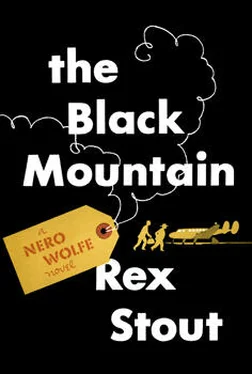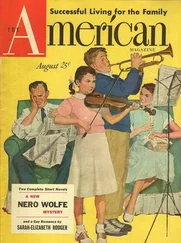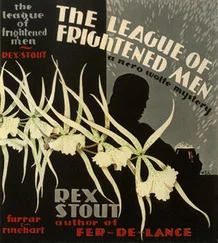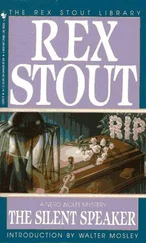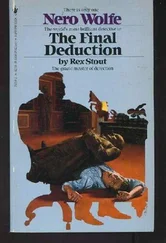It rained all the way across the Adriatic, but the boat was a few centuries newer than Guido’s, with a cabin where I could lie down. Wolfe tried it too, but the bench was so narrow he had to grip a bracket to keep from rolling off, and finally he gave up and stretched out on the floor. The boat, with a crew of two besides the skipper, was fast, noisy, was rated 500 v.p.m., which means vibrations per minute, and was a steeplechaser. It loved to jump waves. No wonder it beat Guido’s time by nearly three hours. It was still raining, and dark as pitch, when it anchored in choppy water and we were herded into a dinghy some bigger than Guido’s. The skipper rowed us into the wall of night until he hit bottom, dumped us on the beach, shoved the nose of the dinghy off, hopped in, and was gone.
Wolfe called to him, “Confound it, where are we?”
He called back, “Where you’re supposed to be!”
“The genial sonofabitch,” I remarked.
With the sweaters draped over our heads, and flashlights, we headed inland. A road going to Molfetta, a fishing village two miles away if we had been landed in the right place, was supposed to be only two hundred yards from the shore, and we found it, turned left, and trudged along in the rain. It was 3:28 a.m. when we hit the road. I was thinking that when we got to the stucco house in Bari I would have Wolfe translate the directions on the water heater in the bathroom.
We made it to Molfetta, knocked at the door of a white house with trees in front, and Wolfe spoke through a crack to the man who unlocked it, and handed him a slip of paper. He was about as genial as the skipper had been, but he agreed to drive us to Bari, twenty-five kilometers down the coast, for five thousand lire. We weren’t invited in out of the rain. We waited under a tree, a European species called a dripping tree, while he put on some clothes, and when he appeared on the driveway in a little Fiat we climbed in the back and sat on wet fannies and were off.
I took my mind off the wet by thinking. Wolfe had reported in full on the boat. There were some aspects that seemed to me a little sour, such as donating the eight grand to that character, but I had to admit he was justified in making his proposal as tempting to Stritar as he possibly could. The only bad flaw was that we didn’t have Zov, and no guarantee that we would get him again. He was to sneak into Italy at Gorizia, as he had before, I don’t know how often, and meet us at Genoa. Wolfe explained that even if Stritar had been willing to send him with us through Bari, having him along would have made matters very difficult.
I was going over it when suddenly the car stopped, the left front door opened, and a beam of light focused on the driver. A man in a raincoat was there. He asked the driver some questions and got answered, and then opened the rear door, aimed the light at us, and spoke. Wolfe replied. It developed into quite a chat, with the man insisting on something and Wolfe insisting back. Finally the man shut the door, circled around the hood to the right front door, got in beside the driver, spoke to him, and twisted in the seat to face us. His hand, resting on the back of the seat, had a gun in it.
I asked Wolfe, “Am I supposed to do something?”
“No. He wanted to see our papers.”
“Where are we going?”
“Jail.”
“But my God, aren’t we in Bari?”
“Entering it, yes.”
“Then tell him to take us to that house and we’ll show him the damn papers.”
“No. At the risk of having it get across the Adriatic tomorrow that I am here? Impossible.”
“What did you tell him?”
“That I wish to see the American consul. Naturally he refuses to disturb him at this hour.”
I am thinking of starting a movement to push for a law requiring two consuls in every city, a day consul and a night consul, and you would join it if you had ever spent a night, or part of one, in the hoosegow at Bari. We were questioned — or Wolfe was — first by a handsome baritone in a slick unifrom and then by a fat animal in a soiled seersucket. Our guns and knives didn’t make them any more cordial. Then we were locked in a cell with two cots which were already occupied by fifty thousand others. Twenty thousand of the others were fleas, and another twenty thousand were bedbugs, but I never found out what the other ten thousand were. After a night in a haystack and one in a deep-freeze cave, it would have been reasonable to suppose that anything different would be an improvement, but it wasn’t. I got a lot of walking done, back and forth the full length of the cell, a good ten feet, being careful not to step on Wolfe, who was sitting on the concrete floor. All I will say about the breakfast is that we didn’t eat it. The chocolate, what was left of it, was in the knapsacks, and they had been taken.
Another section of that law will provide that day consuls will get to work at eight o’clock. It was after ten when the door of the cell opened and a man appeared and said something. Wolfe told me to come, and we were conducted down a corridor and some stairs and into a sunny room where two men sat talking. One of them spoke; and then the other, a lanky, tired-looking specimen with ears as big as saucers, said in American, “I’m Thomas Arnold, the American consul. I’m told you want to see me.”
“I have to see you” — Wolfe glanced at the other man — “in private.”
“This is Signor Angelo Bizzaro, the warden.”
“Thank you. All the same, privacy is essential. We are not armed.”
“I’m told that you were.” Arnold turned and spoke to the warden, and after a little exchange Bizzaro got up and left the room. “Now what is it?” Arnold demanded. “Are you American citizens?”
“We are. The quickest way to dispose of this, Mr. Arnold, would be for you to telephone the embassy in Rome and ask for Mr. Richard Courtney.”
“Not until you tell me who you are and why you were out on the road at night, armed, with no papers.”
“You’ll have to know who we are, of course,” Wolfe agreed. “And so will the police, but I hope through you to arrange that our presence here will not be published. I thought a talk with Mr. Courtney would help, but it’s not essential. My name is Nero Wolfe. I am a licensed private detective with an office in New York. This is my assistant, Archie Goodwin.”
The consul was smiling. “I don’t believe it.”
“Then telephone Mr. Courtney. Or, perhaps better, do you know a man in Bari, a broker and agent, named Paolo Telesio?”
“Yes. I’ve met him.”
“If you’ll phone him and let me speak to him, he’ll bring our passports, properly stamped at Rome when we arrived there on Sunday, four days ago. Also he’ll identify us.”
“I’ll be damned. You are Nero Wolfe?”
“I am.”
“Why the hell were you wandering around at night with guns and knives and no papers?”
“That was indiscreet but necessary. We are here on an important and confidential matter, and our presence must not be known.”
I thought he was doing fine. His asking Arnold to phone the embassy would make the consul suspect that we were on a secret job for the State Department, and if he phoned and Courtney told him we weren’t that would only make him think the job was supersecret. He didn’t get the embassy, at least not from there. He got Telesio, let Wolfe talk to him, and then sat and chewed the fat with us until Telesio arrived with the passports. Wolfe had pressed it on him that as few people as possible should know we were there, so he didn’t tell even the warden our names. He made another phone call, and another signor came, who looked and acted more important than a warden, and he looked at our passports and made it legal for us to breathe. When we left with Telesio they shook hands with us, perfectly friendly, but I noticed they avoided any close contact, which was understandable. They knew where we had been for five hours, that we hadn’t been alone, and that some of our companions were leaving with us.
Читать дальше
